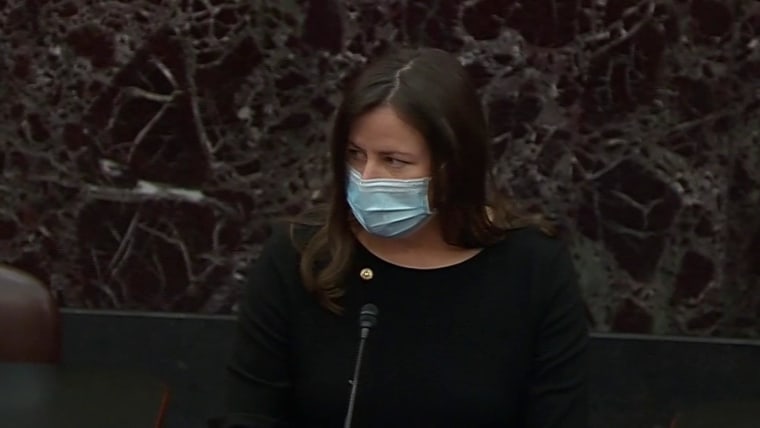The Senate is on the cusp of the historic second Senate impeachment trial of former President Donald Trump.
On Monday, the House delivered its article of impeachment to the Senate. On Tuesday, the members of the House who will act as trial lawyers will be sworn in, with the trial set to begin Feb. 8.
We have likely all made up our minds already whether Trump's behavior rises to the level of an impeachable offense.
The question is straightforward — the sole article of impeachment alleges that Trump incited an insurrection. We all saw the insurrection play out live on television, computer and phone screens across the country. We all saw our elected officials wearing gas masks and sheltering in place in the people's house, the Capitol. We all saw the speech Trump gave moments before the insurrection. We have likely all made up our minds already whether Trump's behavior rises to the level of an impeachable offense.
But while the facts feel relatively clear, the next two weeks give Trump and his GOP allies a chance to strategize. And a primary Republican defense is already taking shape: that the Senate lacks the constitutional power to hold the trial because Trump is no longer in office.
"Our members, irrespective of what they might think about the merits, just believe that this is an exercise that really isn't grounded constitutionally and, from a practical standpoint, just makes no sense," Senate Minority Whip John Thune, R-S.D., told Politico.
This is a demonstrably weak argument. The Senate not only has the constitutional right to try Trump; it has a constitutional duty to do so.
Let us start with the text of the Constitution itself. Article II, Section 4 provides that the president and other federal officials subject to the clause can be impeached for treason, bribery or "other high crimes and misdemeanors." This is no less true if the impeachable offense occurs at the end of a president's term or right before a president were to resign. In fact, in this case, it may be even more urgent to impeach and convict Trump because his alleged actions — working to overturn a free and fair election — threaten the integrity of any democracy's primary way of getting rid of officials: elections.
The impeachment clauses are an important guardrail against transgressive behavior by public officials. Senators would abdicate their duty to "bear true faith and allegiance of the Constitution" if they decided to ignore or forgive high crimes and misdemeanors simply because they occurred toward the end of a politician's term. There are no exceptions or caveats.
Besides the textual evidence, basic logic dictates that former officials are not exempt from impeachment.
Besides the textual evidence, basic logic dictates that former officials are not exempt from impeachment. Otherwise, what would stop any official facing impeachment from simply resigning — or waiting until the last possible minute before engaging in the impeachable offense? Later, if they so chose, the official could always run for office again.
There is precedent here, as well. In 1876, War Secretary William Belknap resigned moments before his impeachment in the House. The end run failed, and he, as a former federal official, faced a Senate trial, in which he was acquitted.
The Constitution does stipulate that there are two possible punishments for impeachment: removal and disqualification from holding another federal office. Not "removal and/or disqualification" — removal and disqualification. The Senate would fail in its duty to support the Constitution and apply the impeachment clauses if it failed to hold a trial and ignored the availability of this form of punishment.
As Article I, Section 3 notes: "Judgment in Cases of Impeachment shall not extend further than to removal from Office, and disqualification to hold and enjoy any Office of honor, Trust or Profit under the United States." If two-thirds of the Senate votes to convict Trump, only a simple majority vote would be needed to disqualify him from further federal office.
The prospect of disqualification is key here. If the Constitution's only punishment were removal from office, the GOP's constitutionality argument might have more merit. But as the text reads, senators would skirt their constitutional responsibilities by failing to evaluate both possible consequences.
Ultimately, constitutional punishments, like criminal ones, serve both to punish and to deter misbehavior. The impeachment clause does not include an exception for an impeachment that occurs late in a president's term or that stretches into the next president's term. This would perversely give presidents incentives to behave especially badly right before they are about to leave office. Interpreting the Constitution's wording differently would serve only to shield potential wrongdoers from accountability.
In Trump's case, the best and perhaps only way to send a message to future authoritarian politicians is to make it clear that you cannot try to undermine democracy and get away with it. In this context, barring Trump from running for office again — which he already has threatened to do — is simply the Senate's fulfilling its responsibility to support our governing document.
In other words, the Constitution not only allows the Senate to hold Trump's second impeachment trial — it mandates it.
"try" - Google News
January 26, 2021 at 04:36PM
https://ift.tt/3pnQmYG
Pro-Trump Republicans claim Senate's impeachment trial is unconstitutional. Nice try. - NBCNews.com
"try" - Google News
https://ift.tt/3b52l6K
Shoes Man Tutorial
Pos News Update
Meme Update
Korean Entertainment News
Japan News Update
Bagikan Berita Ini
















0 Response to "Pro-Trump Republicans claim Senate's impeachment trial is unconstitutional. Nice try. - NBCNews.com"
Post a Comment